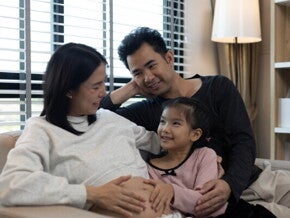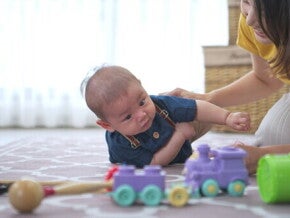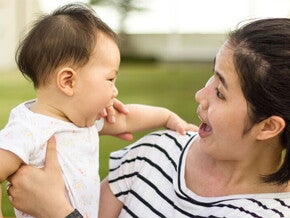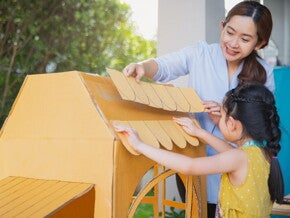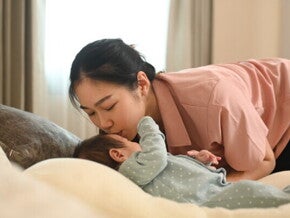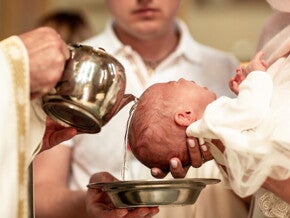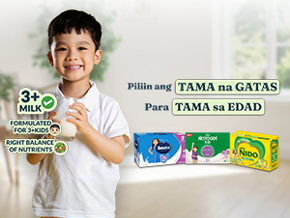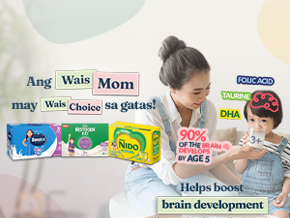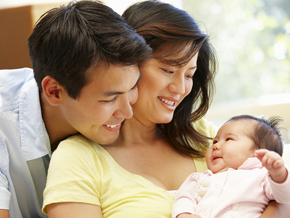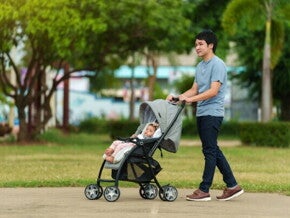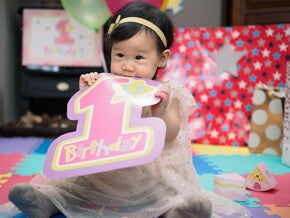
Have Your Camera Ready! A List of Your 1-Year-Old Baby's Milestones
How amazing is it to see how fast your 1-year-old baby is growing. Just think about all the things they can do now compared to just three months ago! They're starting to stand up on their own. They'll say "mama" or "tatay" with a bit of coaching. They're probably babbling non-stop now!
This guide provides you a list of 1-year-old developmental milestones to expect plus what you can do to support your baby's development. Better clear some space in your phone's storage because there's a lot of moments to capture.
Experts Behind the Developmental Milestone Checklists
Before we get to the actual milestones, a quick background on the experts who developed the developmental milestones.
The most widely used developmental checklists today are based on updated guidance from the Centers for Disease Control and Prevention (CDC), in collaboration with the American Academy of Pediatrics (AAP). These milestones reflect what most children—about 75% or more—can do by a specific age.
Experts group these milestones into four main areas:
Below, you'll see developmental milestones for a 1-year-old baby under these areas.
Key 1-Year-Old Developmental Milestones
While this guide focuses on the typical changes around the 12-month milestone, keep in mind that they don't always occur exactly when your child turns a year old. You may notice your child doing some of these a bit earlier or later, and that's okay. Don't feel pressured to rush them, and let them explore at their own pace.
Based on the AAP and CDC's developmental checklists, the lists below reflect milestones from 12 months to 18 months or just before your baby turns 2. If you notice delayed development, always bring it to your pedia's attention.
Motor Skills
Brown University Health defines motor skills as the different ways the body uses muscles to perform specific tasks. Motor skills are grouped into two types:
- Fine motor skills allow your baby to produce small movements, like picking up an object with forefinger and thumb (pincer grasp).
- Gross motor skills let your baby make large movements, such as standing or walking.
The motor skills developmental milestones you may observe in your 1-year-old baby include:
- Pulling up to stand
- Taking a few steps on their own
- Walking while holding onto furniture or without support
- Drinking from a cup without a lid, with or without your help
- Using fingers to feed themselves
- Drawing a line or circle
- Trying to use a spoon
- Climbing on and off a low chair or couch without help
Language and communication
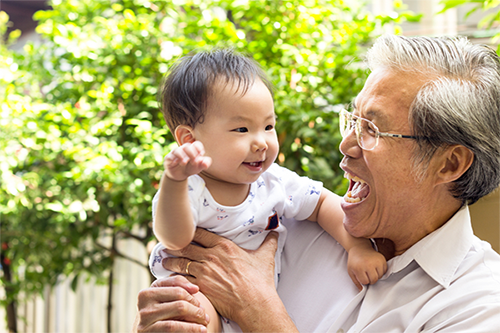
Your 1-year-old baby may not be talking much yet, but how they use sounds and gestures says a lot.
At this early childhood stage, you may notice more back-and-forth communication with your baby. They're not talking much yet, but they're learning they can get your attention with sounds and gestures. They, in turn, also respond when you speak to them.
Here are some typical language and communication developmental milestones at age 1:
- Waves "bye-bye"
- Calls a parent "mama," "dada," or another special name
- Understands "no" (your baby pauses or stops when you say it)
- Tries to say one or two words like "ba" for ball or "da" for dog
- Looks at a familiar object when you name it
- Follows directions (for example, gives you a toy when you hold out your hand and say, "Give me the toy")
- Points to ask for something or to get help
Cognitive function
Your child's curiosity will really take off when they turn 1. You might notice them starting to explore how things work, copy your everyday actions, or play in more purposeful ways. These are all early thinking skills that become the building blocks for later learning.
Some of the cognitive milestones you should see your 1-year-old baby achieve are:
- Putting something in a container, like a block in a cup
- Looking for things you hide in front of them, like a toy under a blanket
- Attempting to use things the right way, like holding a phone to their ear
- Stacking at least two small objects, like blocks
- Copying what you do during household chores
- Purposefully playing with toys, like pushing a toy car
Social and emotional growth
Social-emotional development is all about how your 1-year-old baby starts building relationships and showing emotions. They're responding to people around them, expressing feelings, and being engaged during play more than ever.
Your child is showing social-emotional milestones when they:
- Plays games with you, like "Close Open, Close Open"
- Copies other children while playing
- Shows you an object that they like
- Claps when excited
- Hugs a stuffed doll, toy or you
- Moves away from you but looks to make sure you’re still close by
- Puts out their hands so you can wash them
- Looks at a few pages in a book with you
- Pushes an arm through a sleeve to help you dress them
How to Support Your 1-Year-Old’s Development
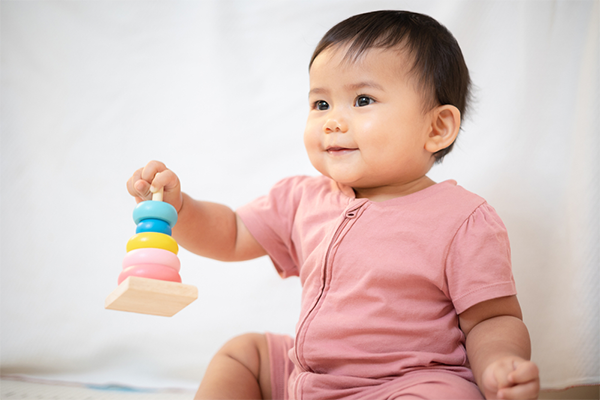
Babies learn a lot through play, but you often don't need fancy toys at this age.
As your child becomes more inquisitive, active (and mobile!), and eager to talk to people and kids outside the family, they'll rely on you to help them learn and build more skills as they grow.
Here are a few ways you can support your 1-year-old baby's development every day. The good news? Most of them don’t require any special tools or toys.
Follow your baby's lead
According to Harvard's Center on the Developing Child, babies naturally gravitate toward new things and experiences, often referred to by experts as the Goldilocks effect. When you're playing with your child, pay attention to what catches their eye and join in on what they find interesting. Try these brain games for babies!
Make time for active play
Give your baby plenty of chances to move, especially when they start cruising along furniture to walk. Encourage them to put toys back in a bin. Create an age-appropriate obstacle course with soft furnishing that provides opportunities for them to crawl, stand, or walk.
Talk throughout the day
Narrate what you're doing and give your child time to respond, even if it's just a sound or a look. Point to things while you name them. Over time, your child will start making those connections, try to say the words back, and actually hold short conversations with you.
Read, sing, and play together!
The Center on Developing Child advises engaging with your child more in playful interactions to build their executive function skills. When you read, sing, and play with them, they can copy your voice or hand gestures, absorb language better, and use their working memory.
Every little interaction matters. The more chances your baby has to explore, move, and communicate, the more confident they’ll become in their abilities.
When Your Child Is Not Hitting Their Milestones
Attending well-child visits regularly allows your pediatrician to closely monitor your child and their developmental milestones. You should also talk to your pediatrician if you notice your baby:
- Hasn't made progress in standing or walking
- Doesn't say words or imitate you when you make sounds
- Doesn't respond to their name
- Doesn't point, wave, or use gestures to communicate
- Seems to lose skills they once had
Your pediatrician can guide you on what's expected for your 1-year-old's growth. They can also refer you to early intervention services when needed. Getting support early can make a big difference if your child has a developmental delay.
From first steps to first words, the 1-year-old stage is full of changes that may feel small day to day, but they all add up. Your job is to give them time, space, and support to explore the world. And when something feels off, reaching out to your doctor is never a bad idea.
Keep showing up, talking, playing, and cheering your 1-year-old baby on. You're helping shape the foundation of their future!
What developmental milestone are you often worried about? Share your thoughts on the ParentTeam Moms and Dads Facebook Group!
References
Brown University Health. “Children’s Developmental Milestones: Gross and Fine Motor Skills | Brown University Health.” Accessed August 28, 2025. https://www.brownhealth.org/be-well/childrens-developmental-milestones-gross-and-fine-motor-skills.
“Medical Encyclopedia: MedlinePlus.” Accessed August 28, 2025. https://medlineplus.gov/encyclopedia.html.
Center on the Developing Child at Harvard University. “Science-Based Approaches for Parents, Caregivers, and Teachers,” August 4, 2025. https://developingchild.harvard.edu/resources/briefs/how-to-motivate-children-science-based-approaches-for-parents-caregivers-and-teachers/.










